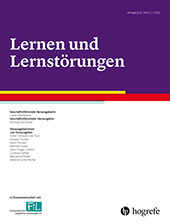Die Rolle von Sprache und Arbeitsgedächtnis für die Entwicklung mathematischen Lernens vom Vorschul- bis ins Grundschulalter
Längsschnittliche und querschnittliche Pfadanalysen von Daten des Nationalen Bildungspanels (NEPS)
Abstract
Zusammenfassung. Jüngere Studien weisen auf die Komorbidität von altersabweichenden Sprachentwicklungsdefiziten und mathematischen Schwächen im Schulalter hin. Darüber hinaus erweist sich das Arbeitsgedächtnis als bedeutsam, weil es mit beiden Lernprozessen verbunden ist. Unter Nutzung von Daten des Nationalen Bildungspanels (NEPS; n = 412) sollten deshalb generelle Einflüsse sprachlicher Kompetenzen und des Arbeitsgedächtnisses (phonologische Schleife, zentrale Exekutive) auf die mathematische Kompetenzentwicklung zwischen Vorschul- und Grundschulalter (4 – 7 Jahre) identifiziert werden. Es zeigten sich neben einem langfristigen Einfluss von Wortschatz und Grammatik auf mathematisches Lernen eine altersabhängige Beteiligung einzelner Arbeitsgedächtniskomponenten. Direkte Einflüsse auf mathematische Kompetenzen im Vorschulalter nimmt die zentrale Exekutive und in der ersten Klassenstufe die phonologische Schleife. Indirekt werden Einflüsse der phonologischen Schleife auf vorschulische mathematische Kompetenzen über sprachliche Vorläufer (phonologische Bewusstheit, frühe Buchstabenkenntnis) mediiert. Stark ausgeprägte Grammatikleistungen im Vorschulalter beeinflussen positiv die weitere Leistungsfähigkeit der phonologischen Schleife und der zentralen Exekutive. Die Bedeutung des Zusammenspiels von Sprache, früher mathematischer Kompetenzen und beider Arbeitsgedächtniskomponenten für die Entwicklung mathematischen Lernens wird diskutiert.
Abstract. Recent studies indicate a comorbidity of age-deviant language development and the occurrence of mathematical weaknesses in school age. Moreover, working memory is an important factor as it is involved in both learning processes. Based on data from the German National Educational Panel Study (NEPS; n = 412) we therefore investigated the effects of linguistic competences and working memory (phonological loop, central executive) on mathematical competence development between pre- and primary school age (4 – 7 years). In addition to a long-term influence of vocabulary and grammar on mathematical learning, an age-dependent participation of individual working memory components was shown. Direct influences on the mathematical competences at preschool age were taken by central executive, in 1st grade by phonological loop. Indirectly, phonological loop influences were mediated on preschool mathematical competences via linguistic precursors (phonological awareness, early letter knowledge). Pronounced grammar skills at pre-school age positively effect the subsequent performances of both, the phonological loop and the executive control. The importance of the interplay of language, early mathematic skills, and both components of the working memory for the development of mathematical learning is being discussed.
Literatur
(1996). Phonological working memory and spoken language development in young children. The Quarterly Journal of Experimental Psychology, 49A (1), 216 – 233.
(2019). The Relationship between visuospatial working memory and mathematical performance in school-aged children: a systematic review. Educational Psychology Review, 31, 509 – 531. doi.org/10.1007/s10648-019-09470-8
(2013).
Wie kommen Zahlen in den Kopf und was kann sie daran hindern? Ein Modell der normalen und abweichenden Entwicklung zahlenverarbeitender Hirnfunktionen . In M. von AsterJ. H. Lorenz (Hrsg.), Rechenstörungen bei Kindern: Neurowissenschaft, Psychologie, Pädagogik (S. 15 – 38). Göttingen: Vandenhoeck & Ruprecht.(1986). Working memory. Oxford: Clarendon.
(2011). Education as a lifelong process. Zeitschrift für Erziehungswissenschaft, Sonderheft 14, 19 – 34.
(2018). Mathematical abilities in children with developmental language disorder. Health and Rehabilitation Sciences Publications. Verfügbar unter https://ir.lib.uwo.ca/hrspub/14 [22.01.2020].
(2007). Phonological awareness and the use of phonological similarity in letter-sound learning. Journal of Experimental Child Psychology, 98 (3), 131 − 152.
(2016). Exploring the role of working memory components in mathematical skills in 5 – 6 years old children. Unveröffentlichtes Manuskript, Sheffield University.
(2008). Prädiktion von Rechenleistung und Rechenschwäche: der Beitrag von Zahlen-Vorwissen und allgemein-kognitiven Fähigkeiten. Berlin: Logos.
(2010). Working memory and fluid intelligence in young children. Intelligence, 38 (6), 552 – 561.
(2007). Arbeitsgedächtnis und Rechnen im Vorschulalter. Die Entwicklung eines Arbeitsgedächtnistests und eines Untersuchungsverfahrens für mathematische Kompetenzen zur Überprüfung des Einflusses des Arbeitsgedächtnisses nach Baddeley auf mathematische Fertigkeiten im Vorschulalter. Frankfurt a. M.: Lang.
(1992). Phonological memory and vocabulary development during the early school years: A longitudinal study. Developmental Psychology, 28 (5), 887 – 898.
(2000). Phonologisches Arbeitsgedächtnis, Wortschatz und morphosyntaktische Sprachleistungen im Vorschulalter. Sprache & Kognition, 19, 15 – 21.
(2011).
Bildungssprache und Durchgängige Sprachbildung . In S. FürstenauM. Gomolla (Hrsg.), Migration und schulischer Wandel: Mehrsprachigkeit (S. 107 – 127). Wiesbaden: VS Verlag für Sozialwissenschaften.(2014).
Förderung des Zahlverständnisses . In G. W. LauthM. GrünkeJ. C. Brunstein (Hrsg.), Interventionen bei Lernstörungen. Förderung, Training und Therapie in der Praxis (S. 199 – 208). Göttingen: Hogrefe.(2009). Exploring the impact of phonological awareness, visual-spatial working memory, and preschool quantity-number competencies on mathematics achievement in elementary school: Findings from a 3-year longitudinal study. Journal of Experimental Child Psychology, 103, 516 – 531.
(2013). The role of the working memory and language skills in the prediction of word problem solving in 4- to 7-year-old children. Educational Psychology. doi.org/10.1080/01443410.2013.814192
(2010). Pathways to mathematics: Longitudinal predictors of performance. Child Development, 81, 1753 – 1767.
(2016). Der Zusammenhang zwischen sprachlichen und mathematischen Kompetenzen bei Kindern deutscher und bei Kindern nicht-deutscher Familiensprache. Dissertation, Freie Universität Berlin.
(2019).
The language dimension of mathematical difficulties . In A. FritzV. HaaseP. Räsänen (Hrsg.), International Handbook of math learning difficulties: From the laboratory to the classroom (S. 437 – 455). Cham: Springer.(2013). Working memory capacity in preschool children contributes to the acquisition of school relevant precursor skills. Learning and Individual Differences, 23, 138 – 144.
(2014). Working memory and language: Skill-specific or domain-general relations to mathematics? Journal of Experimental Child Psychology, 122, 104 – 121.
(2013). Über welche Strategien verfügen Erstklässler mit Sprachstörungen beim Lösen mathematischer Aufgaben? Zeitschrift für Heilpädagogik, 4, 136 – 143.
(2017). Die Rolle von Arbeitsgedächtnis und Sprachkompetenz für den Erwerb mathematischer Basiskompetenzen im Vorschulalter. Psychologie in Erziehung und Unterricht, 64, 81 – 93. doi:10.2378/peu2016.art26d
(2012).
Besonderheiten im Arbeitsgedächtnis bei Kindern mit Sprachauffälligkeiten . In M. HasselhornC. Zoelch (Hrsg.). Funktionsdiagnostik des Arbeitsgedächtnisses (S. 59 – 75). Göttingen: Hogrefe.(2012).
Diagnostik der Funktionstüchtigkeit des Arbeitsgedächtnisses bei Kindern zwischen 5 und 12 Jahren: Die Arbeitsgedächtnisbatterie AGTB 5 – 12 . In M. HasselhornC. Zoelch (Hrsg.). Funktionsdiagnostik des Arbeitsgedächtnisses (S. 1 – 22). Göttingen: Hogrefe.(2015). Sprachlich bedingte soziale Ungleichheit. Theoretische und empirische Betrachtungen am Beispiel mathematischer Testaufgaben und ihrer Bearbeitung. Münster: Waxmann.



